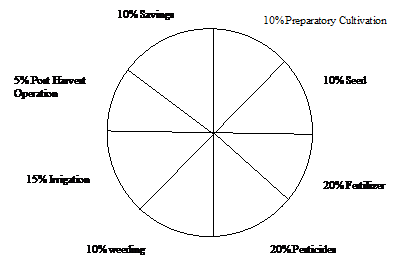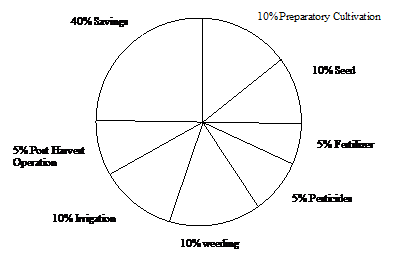 |
|||||||||||||||
|
|||||||||||||||
|
Crop Production |
CENDECT Krishi Vigyan Kendra (CENDECT-KVK), Theni District | Weather |
|||||||||||||
Success Stories Oyster Spawn Production and mushroom cultivation Background: Name: C. Jeya veeran Yield potential: 10 kg of Oyster mushroom per day, 10 kg of Oyster mushroom spawn per day Strenth: Demand of mushroom in Kerala and local markets of Theni Interventions Process: Mr. C. Jeyaveeran, one of the marginal farmers of Indira colony of Erasai village came to the KVK office with the aim of knowing about mushroom cultivation and spawn production. Our kvk SMS plant production visited the house and analysed the resources available and suggested to go for mushroom cultivation and low cost spawn production simultaneously and gave him the technical guidance. Our Cendect kvk supplied two bottles of mother spawn and also given technical guidance for establishing low cost spawn production lab. He inoculated 10 bags initially with the help of our scientist. After 18 days he got uncontaminated good quality of spawn. Then he was motivated to go for spawn production. Simultaneously he also cultivated oyster mushroom. Now he has constructed 20 feet X 20 feet shed with all facilities. He now maintains 300 beds @ 10 beds daily using 150 spawn pockets/ month. Technology: Low cost Oyster mushroom spawns production and mushroom cultivation MDU-2 and APK 1 variety of oyster mushroom Impact Horizontal Spread : No villages covered :10 Economic gains: A)Spawn production-20 bags/ day B)Oyster Mushroom production = 8 kg / day Title: Introduction of Apiculture in Farming Systems Background: Name: C. Manian Yield potential: 10 kg of honeys per hive for 20 hives 90 per cent of cropping area is Horticultural crops (Coconut, banana, Grapes Interventions: Process: Mr. C. Manian one of the marginal farmers of Vadakkupatty, Cumbum came to the KVK office with the aim of knowing about Integrated Apiculture farming system. He actually wanted to do horticulture farming system with introduction Apiculture. Our Kvk SMS plant protection visited the farm and analysed the resources available and suggested Apiculture. He motivated the farmer to attend training on Beekeeping techniques from TNAU, Coimbatore. He introduced initially 5 Italian bee hives. Based on the continuous motivation , follow up visits and technical guidance,and the performance of bee hives,he now maintains 20 bee hives. Yield: 200 Kg/ 20 bee hives/ year Horizontal Spread :No villages covered: 5 Title: Washing Powder preparation Profile of the entrepreneur: Mrs.V. Thilagavathy Education: B.A. degree Family background: The entrepreneur lives in nuclear family with 2 sons Description of the enterprise: 20 kg washing powder/month Interventions: The Home scientist of our KVK imparted training programme on washing powder, cleaning powder, liquid blue, herbal powders, milk and milk products preparation for the Self Help Group at Koduvilarpatti village, Theni District. Mrs.V. Thilagavathy is one of the rural unemployed women of Annai Parasakthi Self Help Group. She had attended many of our training programmes. She is the president of SHG. With the skills learnt, she has started preparing Home care products with the financial assistance from the bank. KVK Scientists gave the technical guidance to become a entrepreneur. She purchased raw materials at with the best quality at whole sale rate. She is now selling the Home care products in the village itself. Now she is selling the Washing Powder in the trade name “Suriya”. IMPACT Horizontal Spread: Now 10 SHG members have started preparation of Home care products for the Home consumption Economic Gains: In this initial stage, she produced 5 kg washing powder per month. After realizing the profit, she increased the production to 20 Kg/month. The cost of production of 20 kg. washing powder was Rs.750/-. So, in one month income, she got profit Rs.500 per month. Title: Organic Banana Cultivation Background: Name: P. Jeyachandhran Process: Mr. P.Jeyachandhran, one of the marginal farmers of Seepalakkotai village has approached our KVK for more information about Organic Banana production and its marketing opportunities. Our KVK scientist gave the technical guidance to the farmer. He participated in the organic banana production training programme in our KVK and also participated state level organic growers association discussional meeting at Madurai. He evinced interesting diversifying his field fully organically. Our KVK distributed various organic inputs like Azospirillum, Phosphobacteria, Pseudomonas, Trichoderma viride, Vermicompost, Paecilomyces, Neem cake etc., to the farmer and motivated to grow organic banana. Our KVK scientists frequently visited his field and gave technical guidance to the farmer. Technology: Earlier days he was facing problems in banana production with chemical fertilizers, pesticides and fungicides and poor quality irrigation water. After motivation of our KVK scientist, he started applying large quantity of Farm Yard manure, green manure, green leaf manure and neem cake and recycling of farm waste for effective soil fertility management. To manage pest and disease incidence, he solely depends on the bio control agents like Pseudomonas, Trichodera viride Paecilomyces for effective control of nematodes. As organic produce are getting popularity among the public, the farmer is able to sell his produce with higher price. Based on the success of his organic banana production, he is now planning to produce organic silk by using organic methods. Impact Economic gains:
Innovative Farmer as a Change Agent cor Technology Transfer Theni District is potential area for Agricultural production with cultivation of cash crops and horticultural crops. Indiscriminate applications of pesticides and fertilizers to the crop were practices of the farmers to increase the yield. Though the farmer felt the yield interms of production and productivity, while calculating the net return/ha they were not able to realise the profit. The farmer Mr.P. Kottaichamy @ Sekar is hailing from Kutchanur village in Uthamapalayam Taluk of Theni District in Tamil Nadu. He developed 15 acres of land holding with adequate supply of irrigation water. The land was initially cultivated with banana, cotton, coconut and groundnut. He used heavy dose of fertilizers and pesticides and other inorganic inputs to the cultivable crop to increase the production and unit area productivity. As this land was developed by him initially, the response in yield was sufficient enough to his expectation. On continuous cultivation, he couldn’t take up the lead because of drastic reduction in production and the increased cost of cultivation. The subsequent years of cultivation pull him down economically and under dept. Interventions of KVK at particular point of time made him to be aware of and adopt technologies of Integrated Farming System. He started practicing the IFS with available resource potential. This approach not only saved lot of investment but also ensured several direct and indirect benefits, prominent among the investment are cattle rearing with 50 nos. of cow, vermicompost unit, cattle feed mill, production of Enriched Farm yard manure, chaff cutting machine weeding machines sale of milk, cultivation of tree fodder etc. Input Cost Before and after Integrated Farming System:
The farmer is able to realize a net profit of Rs. 12 lakhs/year from all the integrated enterprises. He solely depends for 90% of the inputs in his farm and only 10% of the inputs are purchased from outside. Instead of spending Rs. 5 lakhs/-year as in the previous years, now he spent only Rs. 50000/- towards purchase of external inputs. He also produces and sells enriched vermicompost by addition of bio fertilizers and bio pesticides which brings quality to his vermicompost. This quality vermicompost has retained many of farmers to continuously purchase vermicompost from him. Labour Reduction Technologies: Weeding Machine The farmer is having two number of mechanical/power weeder for weed control process in his farm. He used the weed control machine for weeding in banana, coconut and maize. Totally the cost of saving is 60% than by manual labour. The weeding machine covers 30 cents in one hour and the machine consumes 1 lit of petrol which costs Rs.50. The weeding machine can operate 6-8 hrs per day depending upon the moisture level of the soil. If the moisture level is optimum, it takes 6-8 hrs and having variation upto an increase or decrease of 3 hrs per day. Hence to weed 1 ha of land the power weeder takes 8 hour or one day and the cost of weeding is Rs.400 for petrol and Rs.200 for operator and the total is Rs.600. Instead the women labour costs Rs.3300 for 50 labour at the rate of Rs.60/- per labour in the ratio of 1-6. |
|||||||||||||||
Special Technologies |
|||||||||||||||
 |
|||||||||||||||
Home | About Us | Success Stories | Farmers' Association | Farmers' Innovation | Publications | FAQs | Contact
© 2013 TNAU. All Rights Reserved. |
|||||||||||||||

